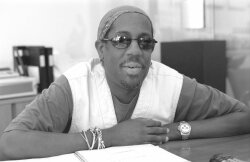Hair-ried: State eyes braiding, abuse
Hair stylist Jeff Burton of Intrinsic salon used to braid hair when he was a kid in Queens, and he remembers watching his aunt braid his cousin's hair.
"It's something that's a part of black culture," observes Kenneth Coles, owner of Kenneth Coles Salon, who shares similar memories. "Everyone remembers their mother braiding hair."
Hair braiding may be a cultural art form, but in the Commonwealth of Virginia, it's going to be regulated. On July 1, 2004, it'll be illegal for anyone without a license to accept money fro braiding, weaving, or adding extensions.
"Hair braiding is considered part of cosmetology," explains Mary Broz, spokesperson for the state department of professional and occupational regulation.
Broz says the state is offering a grace period for hair braiders to be grand-fathered into a new licensing program. "Under the separate license category," says Broz, "hair braiders won't have to have the full 1,500 hours required for a cosmetology license."
Anyone who applies for a waiver now may qualify for a license based on three years of documented experience as a braider, completion of a hair braiding training program, or a braiding license from another state.
Those waivers may not help braiders like the 14-year-old girl who braids Burton's hair.
"I think it's ridiculous," says Burton. "No chemicals are involved. People have been doing it for years. [The government] just wants to get a chunk of that money."
Coles, too, scoffs at the idea of licensing. "People who go to braiders are aware they're not professionals," he says.
Indeed, even the General Assembly grappled with whether it should regulate braiding earlier this year, according to Broz. "But there's the sanitation concern. Licensure provides the necessary level of public protection."
Tonya Jackson doesn't do braiding at her salon, Unique Performance, largely because of the time it takes to do it. "I have much respect for braiders," she says. "I don't think I could take six to eight hours of my day standing there braiding."
Yet she thinks the braiders need to have some hair knowledge. "If there's a problem, they come into salons, and you're not sure what's been done."
Jackson lists problems such as braids so tight they pull hair out, or people who leave braids in so long it causes damage to the hair. "So then they come running to the salon for us to fix it," she says.
Hair thinning can be another hazard of braiding, although Jackson points out that perms, coloring, and relaxers also can thin hair.
Over at the International Beauty Schools, cosmetology instructor Elsie Mills firmly believes hair braiders should be licensed. "They don't have knowledge beyond braiding," she says.
That knowledge includes looking for scalp disorders like lice, scabies, and dandruff, and adhering to sanitation basics like not using the same comb on different heads.
And Mills has another gripe about unlicensed braiders: "They're taking business from us like bootleggers."
Other stylists don't agree– especially the ones who don't do braiding. And there are other economic considerations.
"There are a lot of single women who rely on those dollars to get by," notes Coles, owner of Kenneth Coles Salon.
Burton, who says his braids are documented on a mural at Escafé restaurant, once sat for 12 hours when his hair was longer. "The woman who did mine had three girls, worked full time, and braided on the weekends. It was extra income for her, so I was glad to do it."
"We don't want to impose undue regulatory burdens on people who are trying to make a living," says Broz. "We don't want to make it sound threatening– but anyone who performs hair braiding for money right now without a license is in violation."
***
In other hair stylin' news, Attorney General Jerry Kilgore wants to recruit salon professionals in the war against domestic violence. On August 11, he announced the "Cut Out Domestic Violence" program to train stylists how to respond if they suspect a client is a victim of domestic abuse.
In Charlottesville, the Shelter for Help in Emergency is working on a training program.
"It's an opportunity to get more people familiar with domestic violence, what it looks like, and how it affects the community as a whole," says Stephanie Martin, volunteer coordinator for SHE.
Will hair stylists be picking up the phone to call police if a client comes in with a black eye? "Not necessarily," responds Martin. "We teach them how to approach a client to see if they want to talk about it. We'll give the number of the shelter."
Counseling abuse victims is something Mills at the International Beauty Schools already does.
"A lot of our students are young," she explains. "If they're in abusive situations, we take them for counseling and recommend people in the community they can contact."
Several stylists expressed interest in the training, because they already see battered women coming into salons, and their clients tend to confide in them.
"We already are counselors," says Burton. "We do two jobs and get paid for one."
